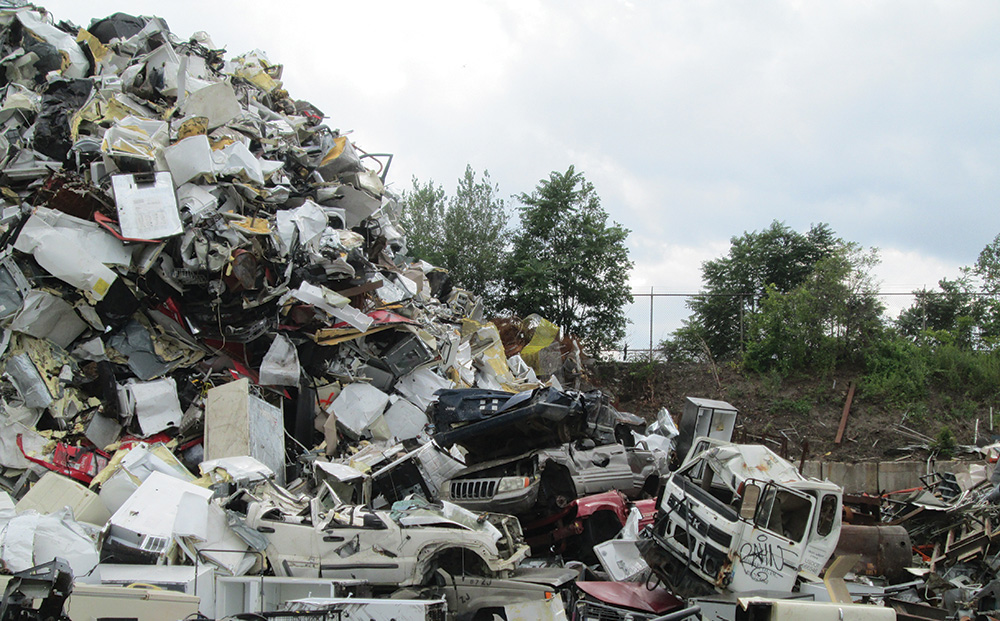In New Hampshire, Massachusetts, and Puerto Rico, CLF holds a scrap metal recycling company accountable for heavy metal pollution defiling critical waterways.
For years, Schnitzer Steel Industries has operated three metal recycling yards in New Hampshire close to the banks of the Merrimack River. The Concord and Manchester facilities accept many types of metal scraps, from broken appliances to junk cars. Workers pile these metal discards in towering heaps before squashing them into giant cubes that get shredded and melted into new products, including sustainable ones like solar panels and wind turbines. In fact, Schnitzer Steel (rebranded as Radius Recycling in 2023) bills itself as a leader in sustainability, reusing millions of tons of materials each year that might otherwise end up in landfills.
But in 2021, CLF advocates uncovered a different reality from the green image Radius Recycling projects publicly. In its self-reporting to the EPA, the company admitted to shockingly high levels of heavy metal pollutants leaking from its scrap yards into the Merrimack. Each time it rained, zinc, copper, aluminum, solids, petroleum, and lead washed from uncovered piles of scrap metal stacked in its yards and into the Merrimack. Some of these toxic pollutants were detected at levels 400 times higher than is safe for people and wildlife, based on EPA standards.
Aghast, CLF advocates combed through five years’ worth of the company’s EPA data from 2016 to 2021. They unearthed levels of pollutants that were downright scary, not only for anyone living along New Hampshire’s Merrimack River – which provides drinking water to 700,000 people – but also for those living near other Radius facilities in Massachusetts and Puerto Rico.
“With the Concord facilities, we were especially concerned about lead, which is dangerous even in small amounts, especially for children,” says Chelsea Kendall, staff attorney with CLF’s Clean Air and Water Program. And the lead levels released from the facilities, she says, weren’t small. They were as much as 1,800% higher than the EPA allows. Yet this multinational, billion-dollar company wasn’t acting to fix these known violations at its facilities, leaving people at risk.

Cleaning Up a Dirty Act
In 2022, CLF sued Radius Recycling (then still known as Schnitzer Steel Industries) over Clean Water Act violations at 11 of its most polluting locations. Those included Massachusetts scrap yards on the Blackstone River in Worcester and Attleboro, the Mystic River in Everett, and its two New Hampshire facilities. CLF also called the company to account for pollution from scrap metal yards that were polluting waterways in Bayamón, Canóvanas, Caguas, Ponce, and Salinas, Puerto Rico. Radius’s pollution of these communities piled onto the already disproportionate burden shouldered by the neighborhoods surrounding its facilities, many of which are communities of color, low-income communities, and communities of non-English speakers who have been marginalized historically.
Radius was quick to come to the table to settle the lawsuit. Late last year, the company agreed to a $2.2 million settlement and to fully comply with the law by cleaning up its pollution. The money collected through the settlement will go to community organizations working to restore local waters in the affected communities. In New Hampshire, one of those organizations is the nonprofit Merrimack River Watershed Council, which will receive $600,000 to improve the river’s water quality.
The settlement is a prime example of how CLF continues to work to uphold existing laws meant to protect the public. For decades, we have vigorously enforced environmental protections – including forcing the cleanup of Boston Harbor and prompting new regulations to prevent Cape Cod communities from spewing nitrogen from septic tanks into local waters. Accountability to the law remains one of our core strengths and most effective tools in driving change.
“These settlements are a big win for the communities that use the Blackstone, Mystic, and Merrimack rivers,” affirms Heather Govern, vice president for CLF’s Clean Air and Water. “We’ve been able to hold a big polluter accountable while allowing communities to restore public waters that had been contaminated.”
Rebirth for a Riverway
Although the waters polluted by Radius Recycling still have a ways to go before they are restored to the quality residents deserve, now there is some funding for cleanup so that people and wildlife can begin to recover. We will remain on the case to make sure river waters stay clean.
John Macone, a policy and education specialist with the Merrimack River Watershed Council, says that the river’s cleanup may be the beginning of people feeling a sense of ownership over the health of a critical local resource that provides drinking water and possibilities for recreation.
“My hats off to Conservation Law Foundation for tackling this because this was an open source of pollution into the Merrimack. It’s going to get cleaned up, and the valley’s going to get some good projects that come out of it.”
